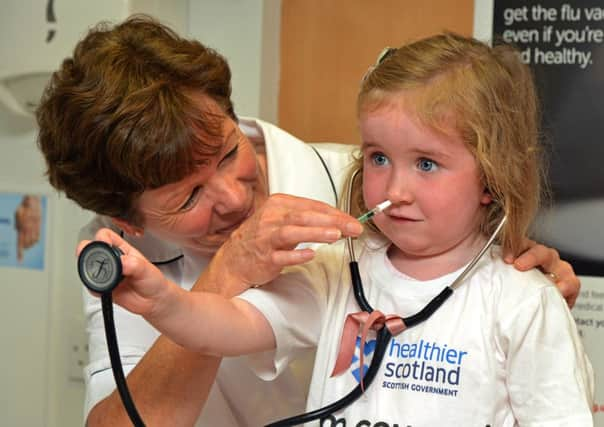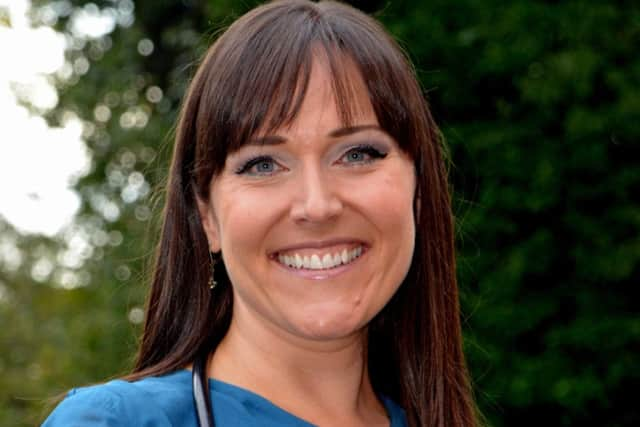How you can reduce risk of flu this winter


The pounding head, the aches and pains, the ‘hit by a truck’ feeling – it’s more than a couple of days off work and then back to normal.
For some its impact can be even greater, landing them in hospital. And, if it spreads to someone in the family whose health is already vulnerable, the consequences could be even worse.
Advertisement
Hide AdAdvertisement
Hide Ad“I can still remember how it felt,” says mum Jane Evans, who was struck down with a particularly nasty flu bug along with daughter Grace, six, in February. “We were ‘proper’ unwell.”


It’s why Jane, from Trinity, didn’t hesitate when it emerged that this year every child in Scotland from two years up to 11 – around 550,000 children – was to be offered the flu vaccine as part of a sweeping new immunisation programme.
It is the first stage in a double-pronged programme: eventually all children from two up to 17 will be given the vaccination to help protect them and reduce the risk of flu spreading.
Children are two to three times more likely to be ill with flu than adults. While many fight it off, in some cases it can lead to complications for them and for others which can become serious.
Advertisement
Hide AdAdvertisement
Hide AdWorryingly, over the last five years, around 500 deaths have occurred each winter which can be attributable to, or related to, flu.
Jane, 43, says she didn’t hesitate when she received a letter offering Grace the chance to have nasal vaccination Fluenz at her school.
“It was very straightforward,” she says. “A quick nasal spray, no side effects. I’m not even sure children realise what’s going on.
“And as a parent, it’s peace of mind.”
Jane and Grace clearly remember falling ill in February with flu. “We are normally really fit and healthy, and lead a very active life. It was a real shock to catch flu and be so ill from it. We were bedridden for a number of weeks last winter.
Advertisement
Hide AdAdvertisement
Hide Ad“I learned in the worst possible way that flu is certainly nothing like a bad cold!
“The virus placed extra pressure on my respiratory system and we both suffered from fevers, aching muscles, sickness, and even ulcers inside our mouths. It was a very distressing time.
“Grace was only five and it was upsetting to see such a young child in so much pain,” she adds. “We have elderly relatives who would be seriously ill if they caught flu from us should we contract the virus again in the future. Flu could be fatal for them. If a family member has a weakened immune system or an underlying health condition, you are keen to protect them.
“The vaccine protects from flu for up to a year, which is great news.”
Advertisement
Hide AdAdvertisement
Hide AdThe vaccine has already been offered to pre-schoolers at GP practices – although new figures show only around 30 per cent of eligible children so far have been vaccinated.
The programme to vaccinate children at Lothian primary schools is now under way. Parents are being advised of the arrangements through letters from school.
Dr Nicola Steedman, right, senior medical officer for the Scottish Government, says it is important parents have their children vaccinated.
“Flu can be very unpleasant for children, and in some cases can develop into more serious health complications such as bronchitis, pneumonia and middle ear infection,” she says.
Advertisement
Hide AdAdvertisement
Hide Ad“If they get the vaccine they will be protected, and because children are good at spreading flu, the vaccine also reduces the risk of others being infected.
“The vaccine is quick and painless and was safely given to children last year. Side effects such as headaches, muscle aches and runny noses are possible, but are usually mild.
“Once fully implemented it is estimated the extension of the programme will prevent an additional 200 deaths a year and up to 1100 hospitalisations, and because viruses constantly change, the vaccination programme will be repeated every winter. Even the healthiest of children can become seriously ill as a result of flu, so I’d urge parents to make sure their child is covered.”
It is not only children who are included in the flu vaccination programme. And anyone who is entitled to a free vaccination is being urged to take up the offer sooner rather than later.
Advertisement
Hide AdAdvertisement
Hide AdAccording to new Lothian figures, 64 per cent of those under 65 with underlying health problems, such as asthma, diabetes, cystic fibrosis and lowered immune systems, have yet to be vaccinated. And 62 per cent of pregnant women have yet to respond to the offer.
Among those to take up the vaccination is Laura Blyth, 26, a student from Pilrig, who, as an asthma sufferer, is entitled to free immunisation. She is encouraging others with underlying health conditions to do likewise.
“Having asthma puts me at risk of being extremely ill if I catch the flu so it’s definitely worth protecting myself.
“Even though I have control of my asthma it can flare up in the winter and I find it hard to breathe on cold mornings – combined with the flu it would be detrimental to my health.
Advertisement
Hide AdAdvertisement
Hide Ad“Three years ago I forgot to book in for the vaccination and contracted the flu virus over winter. I was extremely ill for two weeks, it left me bedridden and I lost a lot of weight.
“It triggered my asthma making it difficult to breathe the entire time. Anyone with asthma can tell you it’s not a fun experience at the best of times, let alone continuous for several weeks. It really hit home the importance of being vaccinated.”
As well as those with underlying health conditions, the free flu vaccines are also available for healthcare workers and some carers. Dr Lorna Willocks, flu immunisation co-ordinator at NHS Lothian, said: “It’s very important that children aged two to five, pregnant women and people with underlying health conditions get vaccinated to reduce the risk of catching flu and suffering serious complications. I urge all those who are eligible for the flu vaccine to speak with their GP practice to arrange their free vaccination. Remember to contact your GP practice to arrange for two to five-year-olds not yet at school to be vaccinated at their local GP.”
“Catching flu can cause unnecessary worry for friends and family as well as posing a risk of spreading the virus to more vulnerable members of society. It is much worse than a bad cold and survives better when it is chilly outside. Flu viruses will circulate across Scotland as we move further into winter so make sure you get protected as soon as possible.”
Advertisement
Hide AdAdvertisement
Hide Adn For more information about the flu vaccine, contact NHS Inform on 0800 22 44 88 or log on to www.immunisationscotland.org.uk. Find out more about the flu vaccine for children at www.immunisationscotland.org.uk/childflu or call the NHS inform helpline on 0800 22 44 88.
Want to dodge the flu? Try these top tips
• WASH your hands as often as possible. Just washing your hands thoroughly can kill off flu or stomach viruses.
• Work up a sweat. Even though it’s cold outside, exercise helps to stimulate your immune system.
• Get the zeds in. Your immune system functions much better when you get enough sleep.
Advertisement
Hide AdAdvertisement
Hide Ad• Pop a pepper – or any other hot foods. Peppers like habanero, cayenne or jalapeno are packed with more vitamin C than a glass of orange juice. So eat a hot curry, make some chilli or just spice up your favourite dinner.
• Stay away from the infected. And if you are ill stay at home, it will help you recover and prevent the virus spreading.
• Reduce stress – too much stress has a highly negative impact on your overall health and, over time, it will make you much more susceptible to a flu infection.
• Don’t smoke and avoid smoke-filled places. First and second-hand smoke significantly impairs your immune system. It also dries out your nasal passages and paralyses cilia, the small hairs in your nose and lungs that help keep out viruses.
• Get fresh air. During the winter the heat from heating systems dries out your mouth and nose and makes you more susceptible to viruses.
• Drink lots of water.